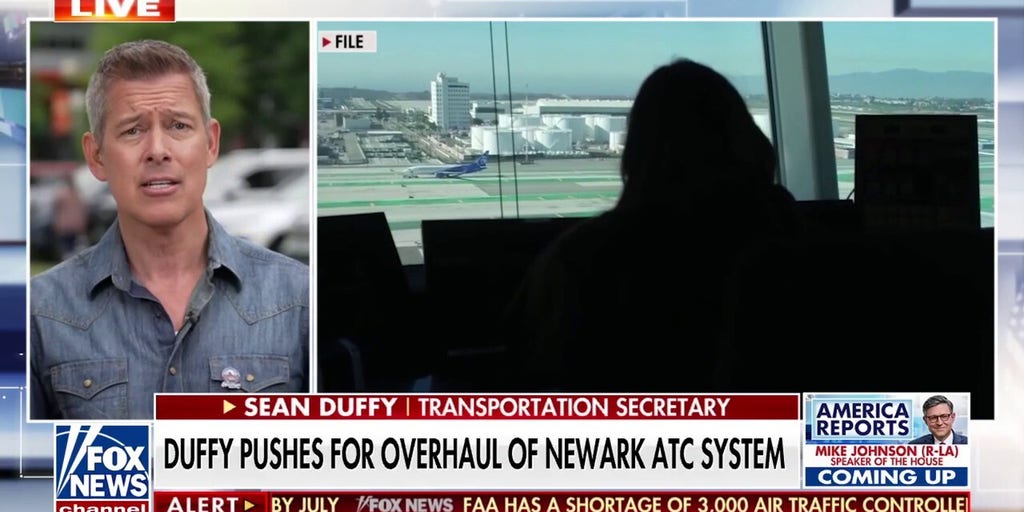Newark Departure Slowdowns Amidst Ongoing Air Traffic Control Debate

Welcome to your ultimate source for breaking news, trending updates, and in-depth stories from around the world. Whether it's politics, technology, entertainment, sports, or lifestyle, we bring you real-time updates that keep you informed and ahead of the curve.
Our team works tirelessly to ensure you never miss a moment. From the latest developments in global events to the most talked-about topics on social media, our news platform is designed to deliver accurate and timely information, all in one place.
Stay in the know and join thousands of readers who trust us for reliable, up-to-date content. Explore our expertly curated articles and dive deeper into the stories that matter to you. Visit Best Website now and be part of the conversation. Don't miss out on the headlines that shape our world!
Table of Contents
Newark Departure Slowdowns Amidst Ongoing Air Traffic Control Debate
Air travel chaos continues to plague Newark Liberty International Airport (EWR), with significant departure delays plaguing travelers and sparking renewed debate over air traffic control modernization. The recent surge in delays has left passengers stranded, flights canceled, and airlines scrambling to manage the fallout. This situation highlights the urgent need for comprehensive reform within the nation's air traffic control system.
The Federal Aviation Administration (FAA) attributes the delays to a combination of factors, including increased air traffic volume, severe weather patterns, and, most significantly, staffing shortages within air traffic control. However, critics argue that these are merely symptoms of a deeper, systemic problem – a technologically outdated and inefficient air traffic control system. The debate surrounding modernization has raged for years, with stakeholders disagreeing on the best path forward.
The Current Air Traffic Control System: A Bottleneck for Growth
The current system, reliant on aging technology and a complex web of procedures, struggles to cope with the demands of modern air travel. This inefficiency is particularly noticeable at major hubs like Newark, where high traffic density exacerbates existing problems. The result? Frustrated passengers, mounting delays, and a significant economic impact on airlines and the broader economy.
- Staffing Shortages: The FAA is facing a critical shortage of air traffic controllers, leading to increased workloads and potential for human error. Attracting and retaining qualified controllers is proving challenging, further contributing to the problem.
- Technological Limitations: Outdated radar systems and communication technologies contribute to inefficiencies and potential for delays. Modernization efforts are underway, but progress has been slow and hampered by budgetary constraints and bureaucratic hurdles.
- Weather Sensitivity: While severe weather is a significant factor, a more efficient system could mitigate the impact of weather disruptions, minimizing delays even during challenging conditions.
The Call for Reform: Privatization vs. Public Control
The debate surrounding air traffic control reform centers on two primary approaches: privatization and continued public control. Proponents of privatization argue that a private sector approach would lead to faster modernization, increased efficiency, and improved safety. They point to successful privatization models in other countries as evidence of potential benefits. However, opponents express concerns about the potential for reduced safety standards and the impact on public access to air travel.
This ongoing debate is not just an academic discussion. The recent delays at Newark underscore the urgent need for a solution. The economic consequences of continued disruptions are significant, impacting airlines, businesses, and individual travelers.
What Travelers Can Do
Passengers flying out of Newark (and other major airports) should be prepared for potential delays. Here are some tips:
- Check flight status frequently: Stay updated on your flight's status through your airline's website or app.
- Allow extra time: Arrive at the airport well in advance of your scheduled departure time.
- Be patient: Delays are frustrating, but patience is key. Remember that airline staff are also dealing with the situation.
- Consider travel insurance: Consider purchasing travel insurance to protect yourself against potential disruptions.
The Newark departure slowdowns serve as a stark reminder of the critical need for comprehensive reform within the nation's air traffic control system. The ongoing debate over privatization versus public control must be resolved swiftly to prevent further disruptions and ensure the smooth and efficient operation of our nation's airports. The future of air travel, and the experience of millions of passengers, depends on it. What are your thoughts on the best way forward? Share your opinions in the comments below.

Thank you for visiting our website, your trusted source for the latest updates and in-depth coverage on Newark Departure Slowdowns Amidst Ongoing Air Traffic Control Debate. We're committed to keeping you informed with timely and accurate information to meet your curiosity and needs.
If you have any questions, suggestions, or feedback, we'd love to hear from you. Your insights are valuable to us and help us improve to serve you better. Feel free to reach out through our contact page.
Don't forget to bookmark our website and check back regularly for the latest headlines and trending topics. See you next time, and thank you for being part of our growing community!
Featured Posts
-
 French Open 2025 Third Round Where To Watch And Full Match Schedule
May 31, 2025
French Open 2025 Third Round Where To Watch And Full Match Schedule
May 31, 2025 -
 Grief At Today Sheinelle Jones Shares The Loss Of Her Husband Uche Ojeh
May 31, 2025
Grief At Today Sheinelle Jones Shares The Loss Of Her Husband Uche Ojeh
May 31, 2025 -
 Jell O Arms Sloane Stephens Opens Up About Athlete Burnout
May 31, 2025
Jell O Arms Sloane Stephens Opens Up About Athlete Burnout
May 31, 2025 -
 Trumps Pardon Spree Continues More Convicted Republicans Freed
May 31, 2025
Trumps Pardon Spree Continues More Convicted Republicans Freed
May 31, 2025 -
 Bidding Begins Nancy Astors Diamond Tiara At Bonhams Auction House
May 31, 2025
Bidding Begins Nancy Astors Diamond Tiara At Bonhams Auction House
May 31, 2025
Latest Posts
-
 Jannik Sinner Vs Carlos Alcaraz A Us Open 2025 Draw Comparison
Aug 23, 2025
Jannik Sinner Vs Carlos Alcaraz A Us Open 2025 Draw Comparison
Aug 23, 2025 -
 Epping Asylum Hotel Government Challenges Court Ruling
Aug 23, 2025
Epping Asylum Hotel Government Challenges Court Ruling
Aug 23, 2025 -
 Government Launches Appeal Against Epping Asylum Hotel Ruling
Aug 23, 2025
Government Launches Appeal Against Epping Asylum Hotel Ruling
Aug 23, 2025 -
 Us Open 2025 Preview Comparing Sinner And Alcarazs Draw Challenges
Aug 23, 2025
Us Open 2025 Preview Comparing Sinner And Alcarazs Draw Challenges
Aug 23, 2025 -
 Detroit Lions Vs Houston Texans Preseason Game Your Complete Viewing Guide
Aug 23, 2025
Detroit Lions Vs Houston Texans Preseason Game Your Complete Viewing Guide
Aug 23, 2025
